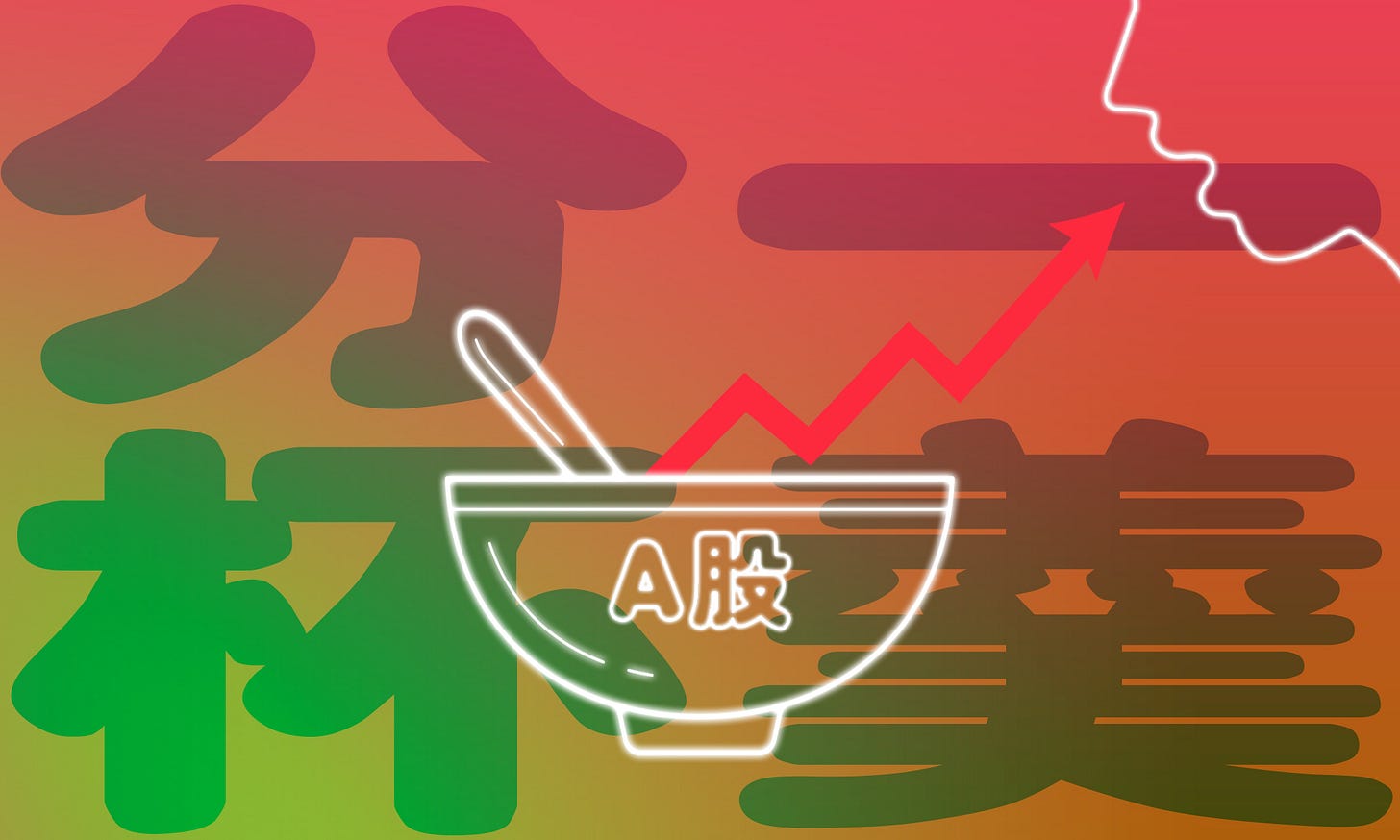Welcome to RealTime Mandarin—a multimedia resource to immerse you in the latest Chinese language trends, inspire you to practice and improve your Mandarin every week, and empower you to communicate with confidence.
Subscribe now to get the next issue straight to your inbox!
Since 24 September, China's A-share market (A股)—which includes shares of Chinese companies traded in RMB on the Shanghai, Shenzhen and Beijing stock exchanges—has experienced a remarkable rally, the likes of which haven’t been seen in years.
In just five days, the Shanghai Composite Index (沪指) surged by 21%, the Shenzhen Component Index (深证成指) climbed 30%, while the ChiNext (创业板) and STAR Market (科创板) indices rose by 42% and 36% respectively.
As the National Day holiday approached, investors riding this frenzied bull market (疯牛) feared the week-long break would interrupt what seemed like unstoppable momentum.
The catalyst behind this surge was an announcement made by the People's Bank of China (PBoC) on Tuesday 24 September. During a press conference held by the State Council Information Office, the bank's governor, Pān Gōngshèng 潘功胜, announced a series of new measures to stimulate the ailing Chinese economy:
Beyond the anticipated measures, such as lowering the reserve ratio, Pan signalled direct support for the stock market.
He announced the introduction of swap facilities for securities, funds, and insurance companies, which would improve market liquidity, giving investors greater flexibility to manage their portfolios and invest more freely in the stock market.
Pan also announced special re-lending programs to assist banks and major shareholders in providing loans for stock repurchases. The Governor hinted too at the potential establishment of a stabilisation fund.
央行行长潘功胜除了宣布下调存款准备金率等常规货币手段之外,专门谈到对股市的支持。潘功胜表示,央行将创设证券、基金、保险公司互换便利,支持金融机构从中央银行获取流动性,大幅提升资金获取能力和股票增持能力。同时还表示将创设专项再贷款,引导银行向上市公司和主要股东提供贷款,支持回购、增持股票。除此之外,潘功胜还表示,正在研究平准基金的创设。[1]
Market confidence soared, and so did share prices.
Two days later, A-shares received another boost following a Politburo meeting on 26 September. In a rare move, the meeting's readout acknowledged the challenges facing China's economy, and sent a strong signal that more stimulus policies were on the way.
This further fuelled investor enthusiasm, and the A-share market continued to soar.
According to analysis in the Chinese media, it was this line from the Politburo meeting readout which got investors excited:
“It is crucial to take proactive steps in key areas by effectively implementing existing policies and introducing new policies, so as to make measures more targeted and effective, which will enable us to achieve the year's economic and social development goals.”
要抓住重点、主动作为,有效落实存量政策,加力推出增量政策,进一步提高政策措施的针对性、有效性,努力完成全年经济社会发展目标任务。
Note: Characteristically vague and open to interpretation, as investors would to find out soon enough. More on that below.
At the time, this combined signalling from the authorities led to one of the strongest rallies ever witnessed in the Chinese stock markets.
Unlike international exchanges, the majority of investors in Chinese stocks are individuals not institutions, known as sanhu in Chinese (散户).
Following the surge in A-shares before the holidays, the number of new sanhu trading accounts opened at major brokerages hit a record high during the Golden Week break, according to state media.
Many of these accounts were opened by 'new investors' (新股民), with no prior investment experience, using their own money in hope of getting rich quickly, unaware of the risks involved:
When the market surged, first-time investors were ecstatic.
They rushed to open accounts and join the frenzy, eagerly hoping to get a piece of the action.
当市场暴涨时,"新股民"兴奋异常,纷纷开户入市,期待着能够在这场狂欢中分一杯羹。
One young but experienced stock market investor and blog writer comments on how his investor friends, some of whom are “new investors”, have had mixed results:
Some people seized the opportunity and made enough for a down payment on a flat.
Others, despite gaining 10%, are still down by around 30% overall and need several more rallies to break even.
Some, even after making a profit, still feel frustrated for missing out on stocks that doubled in value.
Then there are those who just joined the frenzy, planning to Photoshop a stock chart to fool themselves.
有些人赶上了机会,赚了一套房子的首付。有些人虽然赚了十个百分点,但是整体依旧亏损30%左右,还需要几个涨停才能解套。有人虽然赚到了,依旧为没买到翻倍股难受。还有人强行凑热闹,打算P个图骗骗自己。[4]
This recent surge underlines four years of losses in China’s stock markets.
China's A-share market began its downward trend in early 2021. Since then the Shanghai Composite Index dropped from over 3,700 points to around 2,600, which is a decline of nearly 30%; the ChiNext Index has fallen by half over the past four years, while the STAR Market Index has accumulated losses of over 60%.
According to some reports, the performance of the Shanghai exchange is probably much worse, but has been distorted by relatively well performing large-cap stocks, concealing the true extent of the market’s downturn, something we explored earlier this year when China's A-shares tanked by over 8%.
When compared to international exchanges, the performance of China's A-share market over the last four years is even worse.
Since 2021, U.S. and European stock markets have seen cumulative gains of around 50%, while the Indian stock market has surged by 80%. Even Japan, whose stock market had been stagnant for decades, hit a new historic high this year.
In contrast, the disappointing performance of Chinese stocks has led to some creative online jokes and memes shared by investors online in China, like:
I love India! I love Indian stock markets! I hate the cancerous A-Shares!
我爱印度,我爱印度股市,我恨癌股。
“Cancerous A-shares” is a play on the "A" sound of “A-shares”, which is similar to 癌 ái or "cancer" in Chinese.
Since establishing the A-share market in 1990, China has experienced eight bull markets.
According to one prominent finance blogger, the current surge in the Chinese markets has parallels with the bull market of 1999:
If we were to draw a parallel between the current market rally and previous bull markets, it most closely resembles the "519" rally that erupted in 1999.
Between May 19 and June 29 of that year, the Shanghai Composite Index surged from 1,047 points to 1,756 points, a remarkable 66% increase over 31 trading days.
At the time, the macroeconomic environment bore some similarities to today. Following the 1997 Asian Financial Crisis, the global economy was in a slump, China's exports steadily declined, and by 1998, they had turned negative.
我认为本轮行情如果要隐射过去牛市的话,与1999年爆发的519行情最为类似。当年5月19日至6月29日,上证指数从1047点飙升至1756点,31个交易日累计涨幅高达66%。彼时的宏观经济环境,与当前有些相似。1997年亚洲金融风暴过后,全球经济陷入低迷,中国出口一路下行,到1998年变为了负增长。 [2]
So, will the A-share "crazy bull" (疯牛) continue to rise and transform into a "slow bull" (慢牛), or is this merely a short-term aberration driven by market sentiment?
Since returning to work after the Golden Week holidays, investors have already faced disappointment and turbulence. A government press conference held on Tuesday, 8 October, which many hoped would provide more details on further stimulus policies, failed to meet expectations.
On that day, share prices tumbled. The Shenzhen Composite Index dropped by 8.2%, marking its biggest fall since the Asian financial crisis in May 1997, while the Shanghai Stock Exchange fell by 6.6%.
However, as of this writing, the markets remain higher than they were before 24 September. By the close of trading on Friday, 11 October, the Shanghai Index stood at 3,372 points—still 491 points (or 17%) higher than before the PBoC's announcement.
So, what next…?
That's what we are exploring this week!
🎧 Podcast Preview: This week on the RTM+ Member Podcast, we dive into the various ways to describe a “bull market” (牛市) in Chinese, along with the subtle yet confusing distinctions in the usage of the word “stimulate” (刺激). Don’t want to mix up “economic stimulus” (刺激经济), which has a positive connotation, with “emotional stimulation” (刺激感情), which is definitely negative? Join us at the 11-minute mark to enhance your language skills, build confidence, and steer clear of any embarrassing mix-ups!
Favourite Five
1. 放水 fàng shuǐ
inject liquidity, flood the market with money
央行很快便宣布了力度很大的降准降息政策,并且定向向股票市场“放水” - The central bank quickly announced a policy to significantly cut reserve requirements and interest rates, while flooding the stock market with liquidity. [2]
Note: this phrase “releasing water” can mean "match fixing" in football or "cheating" more generally in sport, like when some competitors in the Beijing Half Marathon were accused of letting Chinese runner, He Jie win earlier this year. It's all about context!
Related:
大水漫灌 dà shuǐ màn guàn - "big water fills irrigation", excessive monetary stimulus (specifically referring to the 4-trillion-yuan stimulus package announced after the 2008 global financial crisis)
2. 组合拳 zǔ hé quán
combined fist; a series of combined measures
一系列组合拳出台之后,全方位点燃了投资者的信心 - After a series of combined measures were introduced, investors’ confidence was fully reignited. [1]
Note: In English this might also be translated as a "suite of measures".
3. 分一杯羹 fēn yì bēi gēng
get a piece of the action, take a slice of the pie
他们兴奋异常,纷纷开户入市,期待着能够在这场狂欢中分一杯羹 - They were extremely excited. They opened trading accounts to join the frenzy, hoping to get a piece of the action. [3]
More: Read more about the grim origins of this in tomorrow's Sinica Phrase of the Week.
4. 落袋为安 luò dài wéi ān
secure the profits, cash out
他们首先考虑的是如何将利润落袋为安,生怕市场回调 - Their priority was to secure their profits, as they feared a market correction. [3]
5. 天时地利人和 tiān shí dì lì rén hé
the right conditions
A股本轮行情能够有如此之强的爆发力,源于“天时地利人和” - The explosive momentum of this A-share rally came down to the right timing and favorable conditions. [2]
Note: One of our favourite phrases, which we’ve learned before, like when the conditions were right for an unknown city in Shandong to become one of China’s hottest tourist destinations.
Consuming the Conversation
Useful words
6. 点燃 diǎn rán
ignite, spark
迅速点燃了A股市场的大行情 - It quickly ignited a major rally in the A-share market. [1]
7. 刺激 cì jī
stimulate, boost
刺激的力度远超预期 - The level of stimulus far exceeded expectations. [1]
Related:
提振 tí zhèn - boost, uplift
激活 jī huó - activate, invigorate
8. 涨幅 zhǎng fú
rise, increase
当天A股市场就快速上涨,主要股指的涨幅都超过了4% - On that day, the A-share market quickly surged, with the main indices rising by more than 4%. [1]
Related:
跌幅 diē fú - decrease, drop
股指 gǔ zhǐ - stock index
行情 háng qíng - market trend
9. 反弹 fǎn tán
rebound, bounce back
仅靠政策刺激,也无法催生出如此大的反弹动能 - Policy stimulus alone could not have generated such strong rebound. [1]
10. 凶猛 xiōng měng
fierce, aggressive
过去几年跌幅最大的创业板和科创板,反弹势头也更加凶猛 - The rebound of the ChiNext and STAR Market, which had the largest declines in recent years, has been even more aggressive. [1]
Related:
汹涌 xiōng yǒng - surging, turbulent
11. 亢奋 kàng fèn
overexcited, hyperactive
关键是市场亢奋情绪降温之后,A 股市场会何去何从 - The key question is where the A-share market will go once the overexcitement cools down. [1]
12. 疯牛 fēng niú
crazy bull, irrational exuberance
对于今天的A股疯牛也极具借鉴价值 - It offers valuable lessons for today’s crazy bull market in A-shares. [1]
Related:
牛市 niú shì - bull market
慢牛 màn niú - slow bull, steady rise
13. 飙升 biāo shēng
soar, surge















